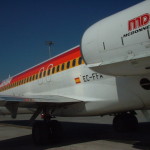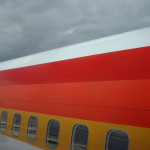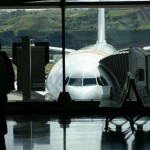Iberia today reported its 2008 results to Spain’s CNMV securities market authority, showing that the Spanish airline earned a profit of 32 million euros in the year, one of the most difficult in recent memory, making it the 13th consecutive year of positive results for the company.
Madrid – The item having the largest impact on the final result was the price of aviation fuel, which cost Iberia 45.5% more in 2008. Iberia spent 1,666 million euros on fuel, 521 million euros more than in 2007. The rise meant that fuel accounted for 30.1% of group-wide operating expenses and 33.6% of those of the transport business.
However, thanks to the cost-cutting and route rationalisation measures prescribed in the strategic plan, the company managed to cut non-fuel operating costs by 5.6%, or some 241 million euros.
Stable Seat Supply
Overall seat/kilometre supply declined by 0.5% in 2008, as the company reorganized its route network to adapt to the economic crisis and the slump in demand. Total available seat kilometres (ASKs) increased by 1.7% in the first quarter, but declined by 0.2% in the third, and 5.3% in the fourth, in response to the weakening market.
While supply on Iberia’s international routes was increased by about 3%, capacity on domestic routes was cut by a hefty 17.1%, in keeping with the provisions of the 2006-2008 strategic plan, and reflecting changes in this market.
The load factor eased by 1.6 points to 80% for the year, but this remained among the top scores by network airlines, and was four points above the average for members of the Association of European Airlines (AEA).
Larger Earnings from Maintenance Division
Total operating revenues declined by 1.3% to 5,450 million euros in 2008, but this was partly due to the depreciation of the U.S. dollar. At constant exchange rates, there would have been a slight increase in revenues. Among business units, the best performer was the maintenance division, whose revenues from outside clients rose by 8.7% to 297 million euros, despite the impact of the weaker dollar, which subtracted more than four percentage points from the total.
Higher Productivity from Personnel and Equipment
One of the chief aims of the 2006-2008 plan was to achieve higher productivity and it was clearly achieved this year. Measured in ASKs per employee, productivity climbed 3.8% in the year, while unit personnel costs declined by 3.9% from 2007 levels, reaching 0.02 euros per ASK.
Meanwhile, utilisation of the aircraft fleet rose by 4.3% to 10 hours aircraft/day, thanks to fleet modernisation and homogenisation measures which concluded in 2008. Today Iberia flies only two types of aircraft, one for long-haul flights and the other for short and medium distances. The average age of Iberia aircraft now stands at seven years.
The Iberia group’s balance sheet at the end of 2008 continues to reflect the company’s sound financial position. With a net worth of 1,564 million euros and current assets of 2,350 million euros, the company is well-placed to withstand the financial crisis and the shortage of liquidity in credit markets.
Strategic Plan 2009-2011
Last year saw the conclusion of Iberia’s 2006-2008 strategic plan, in which all targets were met, or even surpassed –revenues by 8%, and profits by 54%.
Now the company is implementing a new plan for the 2009-2011 period, with the aim of restoring earlier levels of profitability and reaching EBITDAR growth of 15%.
The plan is focused mainly on growing revenues via improvements in service to customers. An investment of 150 million euros is to be disbursed in the period on a comprehensive renovation of Tourist Class, along with the launch of a redesign project for long-haul Business Class, the remodelling of VIP lounges in key airports, the streamlining of boarding procedures for business travellers, changes in all processes, and a determined effort to improve the treatment of passengers.
Iberia will continue to strengthen its leadership of Europe-Latin America and Spain-Europe routes, while maintaining its position in the domestic market, and improving its overall strategic positioning in a continuously changing market.
The company will continue to avail itself of the flexibility which in recent years has enabled it to remain profitable. This means that, in view of the poor behaviour of the markets in the early weeks of 2009, it will implement plans to further trim both capacity and spending.
Photo: Iberia






